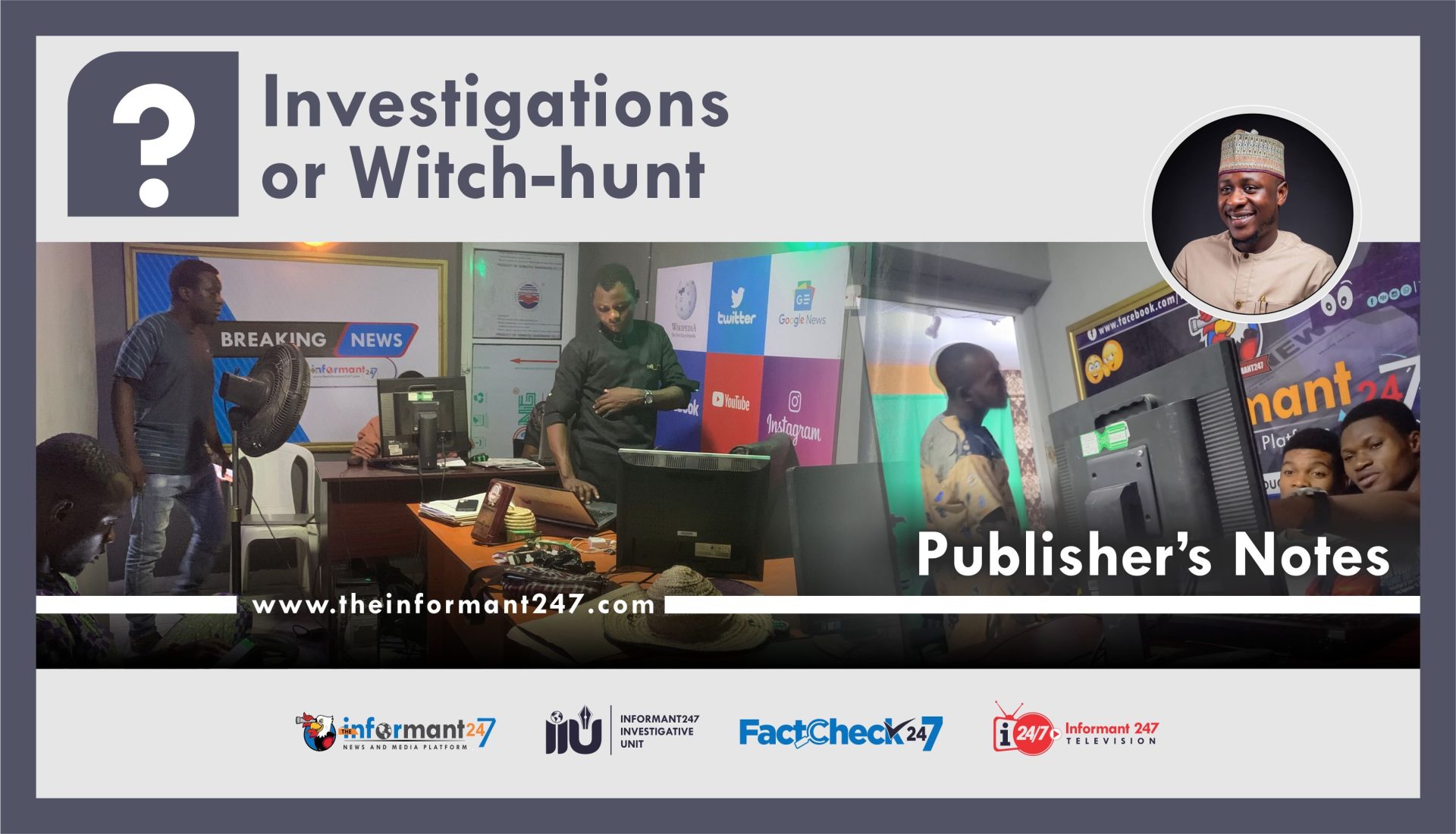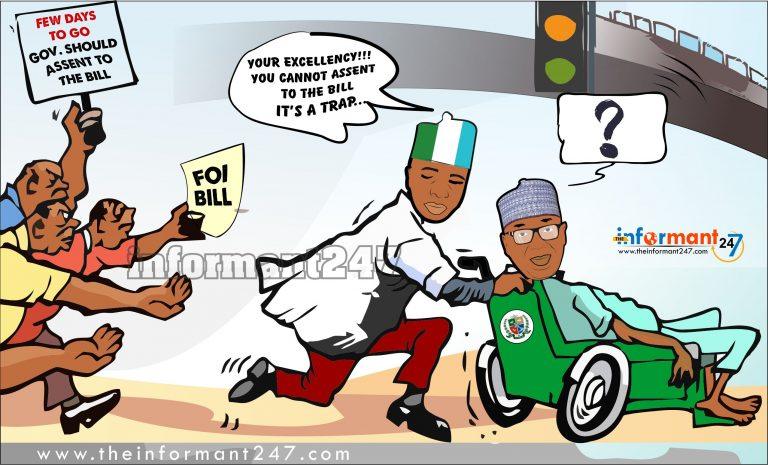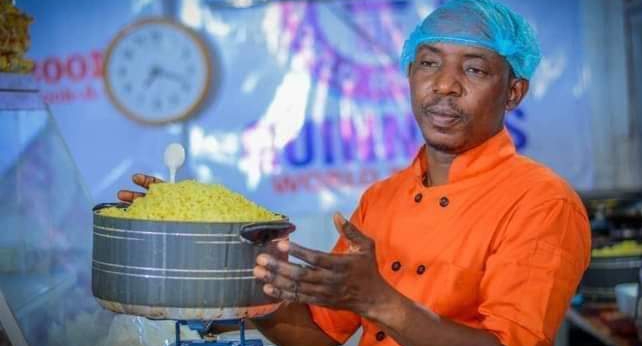Publisher’s note: Investigations or witch-hunt? Why The Informant247 publishes — and what we stand to gain
“I wonder what you want to gain by bringing me down… no one is perfect or a saint. Yes, I admit I did what you claimed — but please spare me from public disgrace.”
These were the words of a subject at the centre of a recent investigation, pleading with our reporter, Toheeb Omotayo, to abandon a story already backed by facts, evidence, and multiple testimonies.
This is not the first such plea we have received — and it is unlikely to be the last. But it captures a painful dilemma: when wrongdoing is acknowledged in private but denied in public, should the press retreat in sympathy or proceed in service of the public?
At The Informant247, our decision is clear. We move forward — not to destroy lives, but to defend the truth.
Why we investigate
The idea that investigative journalism exists to “bring people down” is a misconception — and a dangerous one. Our work is not motivated by vendetta, rivalry, or the pursuit of sensation. Rather, we are driven by three fundamental beliefs:
- That the truth matters
- That power must be held to account
- That silence enables corruption
We do not publish for clout; we publish for consequence. Our stories are fact-driven, evidence-based, and rooted in the public interest.
The ethics behind our decision
We understand that journalism comes with responsibility. Every decision to publish is weighed against questions of fairness, harm, public good, and accountability.
Our investigative desk adheres to the following ethical principles:
- Right of reply: Every subject is contacted and given a fair opportunity to respond.
- Corroboration: Allegations are verified through documents, witnesses, or third-party confirmations.
- Human dignity: Even when exposing wrongdoing, we protect the identities of minors, survivors, and non-essential individuals.
- No payoff, no prejudice: Our reporters accept no gifts, inducements, or favours. Stories are guided strictly by editorial merit.
Our loyalty lies not with power, emotion, or convenience — but with truth, people, and public trust.
Behind every investigation
Publishing investigations is never a decision taken lightly. Behind every story are hours of:
- Fieldwork
- Fact-checking
- Legal vetting
- Ethical debates on how to balance truth with humanity
We acknowledge that no one is perfect — including ourselves. But when wrongdoing is public, systemic, and harmful — especially by those in positions of power — we owe it to our readers to report it truthfully, fully, and responsibly.
What we’ve uncovered: A chronicle of public accountability
Over the years, The Informant247 has published a wide range of impactful investigations. A few examples include:
- Lithium Hunters: Bribery, abuses, deaths by Salihu Ayatullahi exposed dangerous illegal mining in Kakanfu, Kwara State, aided by corrupt officials and enabled by a powerful Chinese company.
- Electoral Manipulations at KWSIEC, a joint investigation by Salihu Ayatullahi, Toheeb Omotayo, and Salihu Shola Taofeek, revealed how the Kwara State electoral body manipulated the 2024 local government elections, disenfranchising voters and doctoring results — with video evidence to prove it.
- How Kwara Polytechnic Rector Misled the Public by Abdulrahaman Taye detailed how revenue surpluses were concealed and diverted while the institution requested financial aid.
- How Kwara Poly Officials Facilitate Contract Scams by Toheeb Omotayo revealed the bribery culture within the Polytechnic, where up to 70% of contract values were demanded as kickbacks.
- How Kwara Governor’s Special Adviser, Mashood Alaka, Defrauded Jobseeker by Toheeb Omotayo showed how a top aide to Governor AbdulRahman AbdulRazaq collected money under the false promise of government employment.
- The Fruit Juice Factory That Never Revived by Yemi Sodeeq tracked the broken PPP agreement in Oyo State, leaving a multi-million naira industry in ruins.
- Oke-Oyan Health Centre Scandal by Abdulrahaman Taye revealed how a local government chairman confiscated vital equipment meant for public health.
- Water Crisis Despite Billion-Naira Budgets by Yemi Sodeeq and Adisa Jaji-Azeez showed how critical infrastructure across Kwara and Kogi States remains non-functional despite massive allocations.
- Healthcare Failure in Kogi State by Adisa Jaji-Azeez exposed systemic rot in hospitals and health centres across multiple LGAs.
- Academic Extortion at Kwara Polytechnic by Toheeb Omotayo documented how a senior lecturer extorted students, manipulated grades, and ran a racket within the school.
These stories — and many others — were not published out of malice. They were published out of necessity.
When the guilty plead for silence
The truth is often uncomfortable. No one enjoys publishing stories that may expose people to disgrace. We empathise with human frailty. But where wrongdoing is proven and consequences affect the public, we do not bury the truth to protect an image.
To do so would be to betray:
- The student whose funds were stolen
- The voter whose mandate was hijacked
- The community denied clean water or healthcare
- The jobseeker tricked and abandoned
Journalism must not fold under pressure. We owe it to the public to act — with fairness, but also with courage.
What we stand to gain
So, what does The Informant247 gain by publishing such reports?
We gain:
- A better-informed society
- A stronger democratic process
- The trust of our readers and audience
- The power of conscience — and credibility
We gain no favours, contracts, or political access. What we earn is the respect of those who rely on facts, not flattery — and that is enough.
Final words
We understand the weight of our work. But we also understand its necessity.
As long as public institutions misuse funds, leaders abuse trust, or citizens suffer in silence — The Informant247 will investigate.
We will not stop.
We will not look away.
We will not be silenced.
Salihu Shola Taofeek
Publisher, The Informant247







